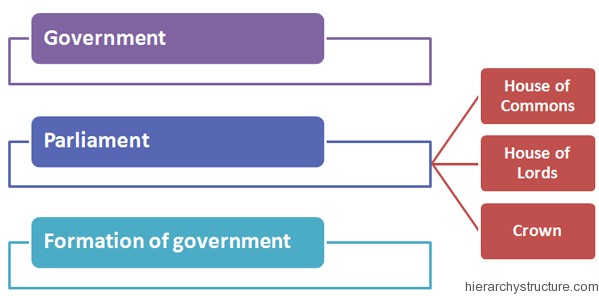The United Kingdom is a parliamentary democracy, which means the government is voted into power by the people. Each and every adult has the right to vote and this is known as universal suffrage. Another system in UK, known as the constitutional monarchy runs in parallel with the parliamentary democracy. In the constitutional monarchy, a monarch is there for showcasing political impartiality and possesses very little powers. At present, Queen Elizabeth Era is an established monarch in the United Kingdom. In this particular article, we will discuss the UK political hierarchy in details.
Both the parliament and the government play an important role in forming the rules and regulations of United Kingdom. They are separate entities but they work together.

Government: The UK government runs the country. It is also known as an executive and it is responsible for developing and implementing various policies and procedures within the country.
Parliament: Also known as Legislature, the parliament is the highest legislative authority in the United Kingdom. The main responsibility of the parliament is to check the work of the government and to approve new laws.
Formation of government: The political party that wins the maximum number of seats in the general elections forms the new government. The government is led by a party leader, who is known as the Prime Minister. The prime Minister appoints various ministers, who work in the government departments and develop various public services and policies.
Role of parliament: The parliament is an essential part of UK political hierarchy. The main roles of the parliament are examining and challenging the work of the government, if necessary; debating and passing of the various laws and enabling the government to raise taxes.
The parliament runs according to the two-house system. All the essential business of parliament takes place in two houses such as:
- House of Commons
- House of Lords
House of Commons:
- The house of Commons is elected by the public.
- The political party with the largest number of members in the Commons forms the government.
- The members of the Commons are also known as MPs and they are responsible for debating the political issues and proposing new laws.
- The prime ministers, chancellors and the leading figures of the main political parties work in the House of Commons.
- The members of the Commons are responsible for making decisions on the financial bills.
- The House of Commons is also responsible for granting money to the government by approving the bills that raise taxes.
House of Lords:
- The House of Lords complement the work of the House of Commons.
- The members of the House of Lords make laws and investigate the policy issues.
- The House of Lords reviews the legislation formed by the House of Commons.
Crown:
- Along with the House of Commons and the House of Lords, the Crown is an integral part of the UK political hierarchy.
- The Crown is also referred to as the monarchy and the current monarch of United Kingdom is Queen Elizabeth II.
- The Crown plays an essential role in opening and dissolving the parliament.
- After a bill is approved by the House of Commons and the House of Lords, it is formally agreed by the Crown to become a law. This procedure is known as Royal Assent.
To know more about Germany Political Hierarchy Click Here
